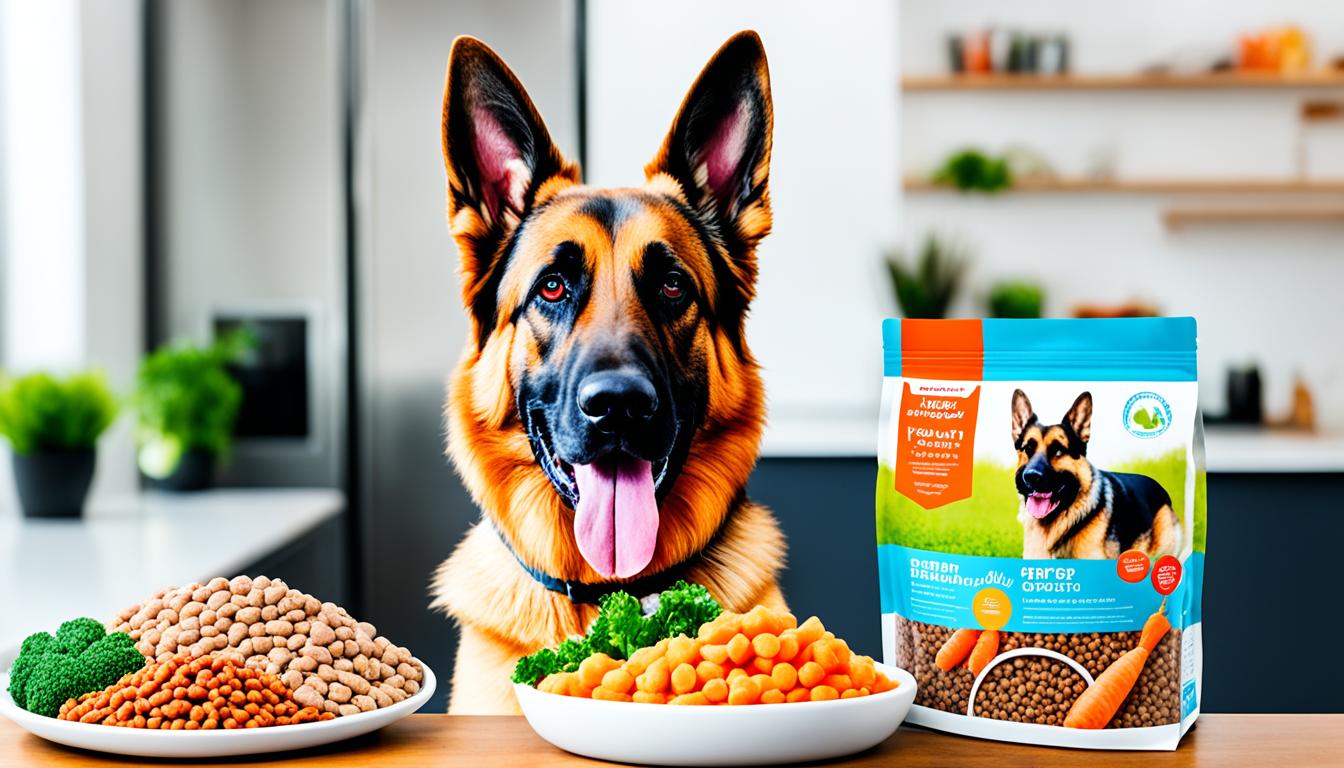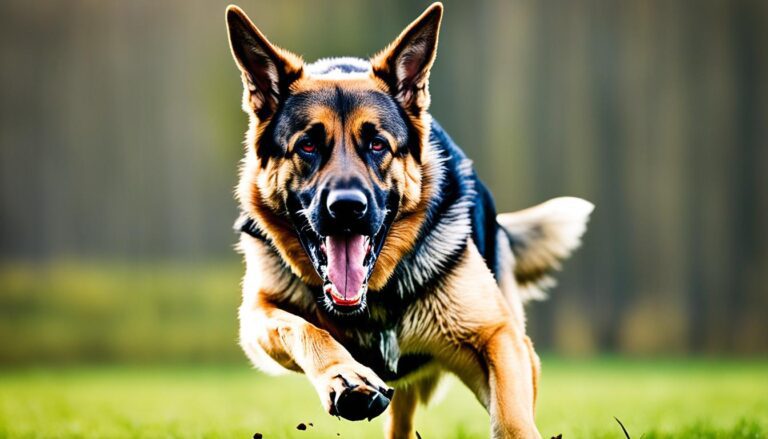German Shepherd Diet Guide: What They Eat
Did you know that the food you feed your German Shepherd can have a major impact on their overall health and well-being? It’s true! A proper diet is essential for this intelligent and loyal breed to thrive and live a long, happy life.
German Shepherds have specific dietary needs that differ from other dog breeds. Their diet should consist primarily of raw, whole foods to ensure they get the essential nutrients they require. In fact, a study conducted by GShepherd revealed that 80% of German Shepherds experienced significant improvements in their health when switched to a raw diet.
By understanding what German Shepherds should eat, you can make informed food choices and provide the best nutrition for your furry friend. In this guide, we will explore the ideal diet for German Shepherds, factors to consider when selecting dog food, and key tips for feeding your German Shepherd a healthy diet.
Are you ready to unlock the secrets to a healthier, happier German Shepherd? Let’s dive in and discover what these amazing dogs should be eating to thrive!
Factors to Consider When Selecting Dog Food for German Shepherds
Selecting the best food for your German Shepherd can be a daunting task. With numerous options available in the market, it’s crucial to choose a diet that suits your dog’s specific needs. Factors such as lifestyle, age, health issues, and budget should be taken into consideration to ensure your furry friend gets the nutrition they require to thrive.
German Shepherds have their unique eating habits, and understanding them is essential in making the right food choices. Whether you opt for raw food, commercially prepared fresh foods, or homemade diets, it’s crucial to prioritize your dog’s preferences and dietary requirements.
When selecting dog food, consider the following:
- The Type of Food: German Shepherds can thrive on a variety of diets, including kibble, raw, and homemade. Each has its advantages and disadvantages, so it’s important to research and consult with a veterinarian to determine which type is best for your dog.
- Grain Content: Some dog owners prefer grain-free diets for their German Shepherds. Grain-free options can be beneficial for dogs with grain allergies or sensitivities. However, it’s essential to consult with a veterinarian to ensure that the diet provides all the necessary nutrients.
- Ingredients: Opt for dog foods that are made with natural and holistic ingredients. Look for high-quality protein sources, such as chicken, beef, or fish, and avoid artificial preservatives, colors, and fillers.
- Cost: Consider your budget when selecting dog food. While premium brands may be more expensive, they often use higher-quality ingredients. It’s important to strike a balance between cost and quality to ensure your German Shepherd’s nutritional needs are met.
By considering these factors and conducting thorough research, you can make an informed decision when selecting the best diet for your German Shepherd. Remember that every dog is different, and it may take some trial and error to find the optimal food that suits your furry friend’s needs.
Investing time and effort into understanding your German Shepherd’s dietary needs and choosing the right food is an essential part of responsible pet ownership. A healthy and balanced diet will contribute to your dog’s overall well-being and enhance their quality of life.
The Ideal Food Composition for German Shepherds
When it comes to the nutrition of your German Shepherd, providing a balanced diet is essential for their overall health and well-being. German Shepherds have specific dietary requirements that differ from other breeds, and it’s important to tailor their diet accordingly. A well-planned and breed-specific diet can help prevent health issues and ensure that your German Shepherd thrives.
German Shepherds have a shorter colon compared to other breeds, which means they require a high-fiber diet. Fiber slows down the movement of food in the digestive system, allowing for better nutrient absorption. Incorporating fiber-rich ingredients in your German Shepherd’s diet, such as leafy greens like cabbage and alfalfa, can support their digestive health and provide the necessary nutrients.
In terms of proteins, a balanced diet for German Shepherds should include high-quality meat sources like beef. Protein is essential for muscle development, energy, and overall growth. It’s important to choose lean cuts of meat and avoid processed or fatty meats that can lead to weight gain and health issues.
Vitamins and minerals are also crucial for the well-being of German Shepherds. They require a variety of vitamins such as A, B, D, and E, as well as minerals like calcium, copper, and zinc. These nutrients support various bodily functions, including a strong immune system, healthy bones, and optimal organ function.
Feeding your German Shepherd a raw food diet can provide the essential nutrients and health benefits they need. Raw food diets, which consist of unprocessed meats, bones, and vegetables, closely resemble what dogs would eat in the wild. This type of diet promotes better digestion, healthier skin and coat, increased energy levels, and improved overall health.
Nutritional Supplements
In addition to a well-rounded diet, it can be beneficial to incorporate nutritional supplements to ensure that your German Shepherd receives all the necessary nutrients. Supplements such as fish oil, which is rich in omega-3 fatty acids, can support joint health, reduce inflammation, and promote a shiny coat. Probiotics are also beneficial for maintaining a healthy gut flora and supporting proper digestion.
Consult with a Canine Nutritionist
Every German Shepherd is unique, and their dietary needs may vary based on factors such as age, activity level, and overall health. It’s important to consult with a canine nutritionist or veterinarian to create a customized diet plan for your German Shepherd. They can provide expert guidance on portion sizes, meal frequencies, and any specific dietary considerations based on your dog’s individual needs.
| Nutrient | Function | Sources |
|---|---|---|
| Protein | Essential for muscle development and growth | Beef, chicken, fish, eggs |
| Fiber | Supports healthy digestion and nutrient absorption | Leafy greens, such as cabbage and alfalfa |
| Vitamins | Supports overall health and immune function | Fruits, vegetables, organ meats |
| Minerals | Essential for bone health and proper bodily functions | Dairy products, nuts, seeds |
Feeding Your German Shepherd a Healthy Diet
Feeding your German Shepherd a healthy diet is crucial for their overall well-being. As responsible pet owners, we want to make sure our furry friends receive the best nutrition possible. When it comes to German Shepherds, a raw, species-appropriate diet is highly recommended. This type of diet closely mimics their natural eating habits, providing them with the nutrients they need to thrive.
Prioritizing high-quality protein is essential for your German Shepherd’s diet. Opt for lean meats such as chicken, beef, or turkey, which are packed with amino acids that promote muscle growth and repair. Additionally, healthy fats like omega-3 fatty acids can support their skin, coat, and joint health. Incorporating a variety of fruits and vegetables is also important, as these provide essential vitamins, minerals, and antioxidants.
To ensure you’re providing the best diet for your German Shepherd, it’s essential to do thorough research. Consult with a canine nutritionist or your veterinarian, who can provide you with personalized advice based on your dog’s specific needs. They may recommend supplements or additional nutrients to ensure a well-balanced diet. Remember, a healthy diet for your German Shepherd is all about variety and balance over time.
By making informed food choices and prioritizing your German Shepherd’s nutritional needs, you’re taking an important step towards their long-term health and happiness. Enjoy the satisfaction of seeing your beloved companion thrive on a diet that supports their overall well-being. Your German Shepherd will thank you with boundless energy and a wagging tail!
FAQ
What should I feed my German Shepherd?
German Shepherds thrive on a natural, whole food diet that consists mainly of raw food. This type of diet helps keep them healthy and prevents common health issues such as obesity, joint problems, and allergies.
What factors should I consider when selecting dog food for my German Shepherd?
Factors to consider when selecting dog food for German Shepherds include lifestyle, age, health issues, and budget. Raw food, commercially prepared fresh foods, and homemade diets are all suitable options. It’s important to prioritize the dog’s specific needs and preferences when making food choices.
What should be included in the ideal food composition for German Shepherds?
The ideal diet for German Shepherds should include high-quality protein, healthy fats, vitamins, minerals, and fiber from vegetables and berries. A blend of beef, wheat, leafy greens like cabbage and alfalfa is recommended as the base diet. Additional nutritional supplements may also be beneficial.
How can I ensure my German Shepherd is eating a healthy diet?
Feeding your German Shepherd a healthy diet involves prioritizing high-quality protein, healthy fats, and a variety of fruits and vegetables. Thorough research, consulting with a canine nutritionist, and making adjustments as needed are important steps. Remember that variety and balance over time are key to providing a healthy diet for your German Shepherd.







